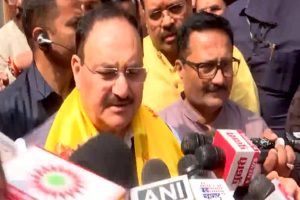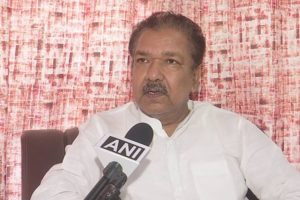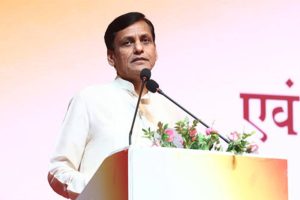The Bharatiya Janata Party (BJP) made a resounding comeback in the Delhi Assembly elections on Saturday, securing a two-thirds majority and ending a 27-year wait to reclaim power in the national capital. In a significant blow to the ruling Aam Aadmi Party (AAP), the party saw a drastic reduction in its seat count, while the Congress continued its disappointing streak.
The BJP won 48 seats, a remarkable victory for the party, which now returns to governance in Delhi after nearly three decades. Key AAP leaders, including former Chief Minister Arvind Kejriwal, lost in their strongholds, with only Chief Minister Atishi managing to retain her seat.
The election results, which followed BJP’s sweeping victories in Maharashtra and Haryana, further solidified its dominance in national politics.
The Congress, which once ruled Delhi for 15 years from 1998, failed to secure a single seat once again, marking a third consecutive defeat in assembly elections.
In a speech at the BJP headquarters, Prime Minister Narendra Modi praised the party’s victory. He celebrated the widespread support the BJP had received across the city, saying, “There is no area in Delhi where the lotus did not bloom. People from every language group voted for us.” He further remarked on the party’s growing presence and influence in the national capital, particularly highlighting his roots in Purvanchal.
Modi also took jabs at AAP, calling it “AAPda” (disaster) and targeted Congress for its failure, stating that it had achieved a “double hat-trick of zero” in the elections. The Prime Minister remarked, “The people of Delhi have shown that there is no place for shortcuts and lies in politics.”
He continued, emphasizing that the BJP would deliver on its promises and usher in an era of good governance in Delhi. “The youth born in the 21st century will now experience BJP’s governance for the first time in Delhi,” Modi added.
Earlier, Modi had also taken to social media, describing the victory as a triumph of “good governance” by the party at both the national and state levels. He pledged that the BJP would spare no effort in improving the quality of life for Delhi’s citizens and making the city a prime contributor to the vision of a “Viksit Bharat” (Developed India).
Several senior AAP leaders, including former Deputy Chief Minister Manish Sisodia, Delhi Minister Saurabh Bhardwaj, and former ministers Somnath Bharti and Satyendra Jain, were defeated. Kejriwal himself lost in the New Delhi seat to BJP’s Parvesh Verma by over 4,000 votes.
Kejriwal conceded defeat, accepting the mandate of the people, and congratulated the BJP on its victory. “We accept the people’s mandate with great humility,” Kejriwal said. He also reflected on the party’s achievements in areas like healthcare, education, and infrastructure over the past decade and vowed to play a constructive role as the opposition while continuing to serve the people.
The election results largely matched the predictions of exit polls, which had anticipated a BJP win.
In the Kalkaji seat, Atishi triumphed over BJP’s Ramesh Bidhuri by more than 3,500 votes, while Congress’s Alka Lamba secured 4,392 votes. Atishi thanked the people of Kalkaji for their trust and expressed a determination to continue fighting against the BJP.
Sisodia, who lost by a narrow margin of 675 votes to BJP’s Tarvinder Singh Marwah in Jangpura, conceded defeat and hoped the winning candidate would work for the constituency’s betterment.
Other notable winners from BJP included Gopal Rai, who won Babarpur with a margin of 18,994 votes, and Kailash Gahlot, who triumphed from Bijwasan after defecting from AAP to join BJP months before the election.
Union Home Minister Amit Shah also expressed his gratitude to Delhi voters for their support. “This is a victory of Modi’s vision for development and the people’s faith in his leadership,” Shah said. He also pointed to issues like the dirty Yamuna, poor infrastructure, and public dissatisfaction with the AAP government’s handling of essential services as key factors in the BJP’s victory.
AAP, which had won 62 seats in the 2020 elections and 67 seats in 2015, faced a steep decline in support, with its seat count dropping to just 22.
The vote counting began on Saturday morning, following elections on February 5.





